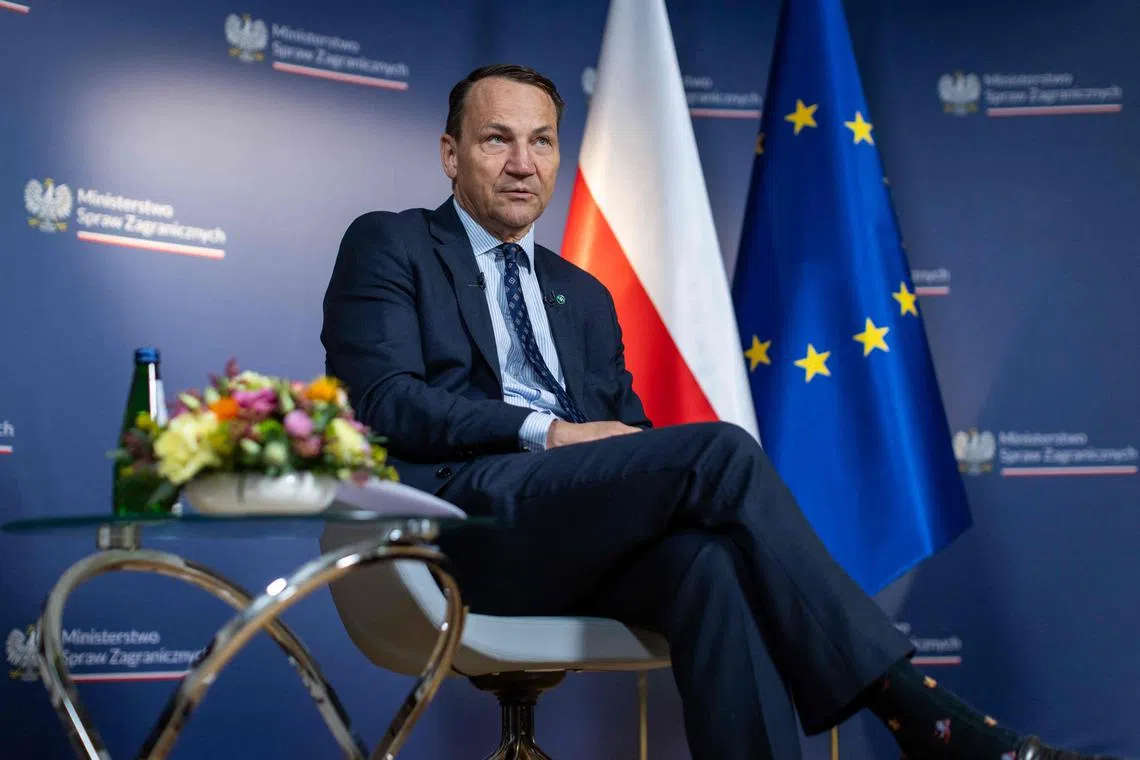Poland says arms race could lead to Putin’s fall
Sign up now: Get ST's newsletters delivered to your inbox

Russian President Vladimir Putin is "waging a very expensive war" in Ukraine, said Poland's Foreign Minister.
PHOTO: AFP
- Sikorski warns a new arms race, triggered by Putin's Ukraine war, could lead to the collapse of Putin's regime, similar to the Soviet Union's fall due to excessive military spending.
- Nato countries, including Germany reaching 3.5% GDP spending by 2029, are increasing defence spending to counter the "long-term threat posed by Russia to Euro-Atlantic security”.
- Poland, earmarking 4.7% of GDP for military in 2024, aims to deter Putin with a strong force, seeing countering the Russian missile threat from Kaliningrad as a Polish-German challenge.
AI generated
WARSAW – Polish Foreign Minister Radoslaw Sikorski said on June 26 that a new arms race could lead to the fall of Russian President Vladimir Putin’s “regime”, just like it toppled the Soviet Union.
The Nato member’s top diplomat spoke after the Western defence alliance agreed to massively ramp up
“Putin should understand that he is on the path of (Soviet leader Leonid) Brezhnev. He himself once said that the Soviet Union collapsed because it spent too much on armament, and now he is doing exactly the same thing,” Mr Sikorski said, in an interview with AFP, the Polish Press Agency and German agency DPA.
“He is waging a very expensive war... scared the whole West into reinforcing its defence spending,” Mr Sikorski said, adding: “We are doing it because Putin is threatening us”.
“This means that from an economy the size of Texas, Putin will have to squeeze out even more defence funds. Hopefully with a similar result for the regime (to that of the Soviet Union), but faster.”
Nato’s 32 countries agreed to US President Donald Trump’s headline target of 5 per cent of gross domestic product (GDP) on defence spending following two days of talks in The Hague.
The compromise hatched by Nato sees countries promise to dedicate 3.5 per cent of GDP to core military spending by 2035, and a further 1.5 per cent to broader security-related areas such as infrastructure.
Underpinning the leaders’ discussions on defence was Moscow’s invasion of Ukraine, with the summit’s final statement referring to the “long-term threat posed by Russia to Euro-Atlantic security”.
Mr Trump also signed off on a final declaration confirming an “ironclad commitment” to Nato’s collective defence pledge that an attack on one is an attack on all – a reassuring move for European countries worried about Russia.
‘Trump understands’
Fearing threats from neighbouring Russia, Poland has for several years rapidly modernised its military, with a string of arms contracts, mainly with the United States and South Korea.
It has already earmarked 4.7 per cent of its GDP for military expenditure in 2025, and in 2026 it aims to raise it further.
Mr Sikorski said “Trump understands now that it is Russia that does not want an end to the war” in Ukraine, which began with Russia’s invasion in February 2022.
He said that at the Nato summit, “I drew attention to the fact that this shows a lack of respect on the part of Vladimir Putin towards the peace initiatives of President Trump”.

Poland’s Foreign Affairs Minister Radoslaw Sikorski said US President Donald Trump understands that Russia does not want an end to its war in Ukraine.
PHOTO: AFP
Mr Sikorski also hailed Germany – Europe’s biggest economy – for its efforts to boost its military.
This week, Germany revealed plans to reach the 3.5 per cent level for core spending six years early, in 2029, with the vast extra outlays necessary made possible after the country eased its rules on taking on debt.
Chancellor Friedrich Merz has vowed to build Europe’s “strongest conventional army” to counter the growing threat from Moscow.
Mr Sikorski said “we are good allies and we need to build a kind of force that will not scare anybody but that will deter Putin”.
“And I would see the need to counter the Russian missile threat from the Kaliningrad exclave as an urgent Polish-German challenge,” he added.
Poland shares a border with Russia’s heavily militarised Kaliningrad exclave. AFP


